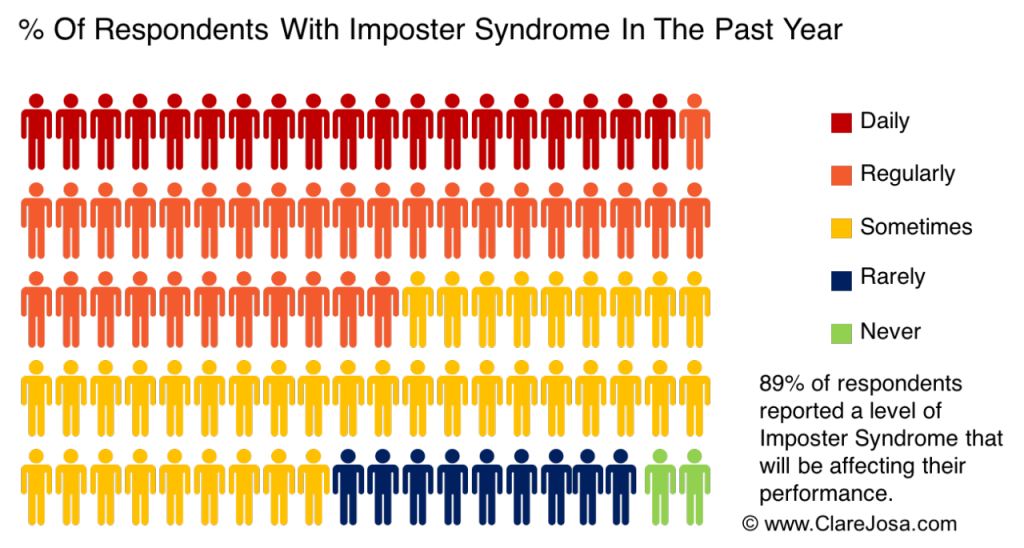That’s the most common response I hear from budget-holders in big businesses: that despite the results of the 2019 Imposter Syndrome Research Study, it’s not a an issue in their firm.
And, of course, that might be true. But it’s unlikely. Especially if they haven’t done anything to actively spot and address Imposter Syndrome and its damaging effects on people, productivity, performance and profit.
These also tend to be the firms who think that closing the gender pay gap is the role of the remunerations team, and who judge women who ask for flexible working as not committed enough to their careers and not worthy of senior leadership roles.
And they tend to be the companies who recruit ‘mini-me’ alpha-males to replace retiring C-suite executives, not yet valuing the enormous contributions that female staff bring to the business. Unless they start behaving like alpha-males, too.
The Research Study found that these were the three core drivers in the gender pay gap and lack of gender parity in leadership roles: the alpha-male culture in the C-Suite, lack of flexible working, and Imposter Syndrome.
And these firms may never change. They may never close the gender pay gap. They may never achieve gender parity in senior leadership roles. Not even if a new government legislates to make reporting your plans to close those gaps compulsory.
They are in denial about the real causes of the challenges they face.
But there are other companies out there who are prepared to open their eyes, even if that feels scary, to talk about the F-word (feelings), and to acknowledge that mental and emotional wellbeing are core to an employee’s performance, rather than just something to be delegated to the HR intern to run some ‘lunch and learn’ sessions.
These are the companies who can see that Imposter Syndrome can turn a thriving team toxic in just a few months. They are the firms who are passionate about empowering staff to show up as all of who they really are, rather than a shut-down, play-it-safe automaton. They are the businesses who will attract the best leaders and grow their in-house rising stars, with a reputation of being the firm in the industry to work for.
The 2019 Imposter Syndrome Research Study showed that is the last taboo in the personal development field at work. Those struggling with it would rather leave a role they love, hoping to find one that doesn’t trigger their fear of being ‘found out’ as not good enough, than ask for help and support.
It also showed that hardly any firms have processes in place to spot Imposter Syndrome, let alone training and mentoring support, to help someone to clear it out, once and for all. So their staff – up to 89% of them – are ‘pushing on through’, lying awake at 3am, worrying that someone might realise they’re a fraud, trying to hide the performance-trashing stress and anxiety that brings with it.
It’s not because these firms are ‘evil employers’. It’s because there are so many myths out there about Imposter Syndrome being incurable – or inevitable – or a ‘badge of honour’ to justify poor performance – that businesses don’t know where to start, to deal with it.
The Research Study White Paper gives you the initial facts you need, to start making bold decisions on this. And if you are serious about making Imposter Syndrome a thing of the past, so your organisation can grow and thrive amidst the current market challenges, DM me to set up a call.
If you’re struggling with Imposter Syndrome yourself, DM me to set up a call about options to work together. My landmark 1:1 mentoring programme can support you to create life-changing breakthroughs in under 90 days. So you could be on your way to being free from Imposter Syndrome – forever – in as little as ninety days.
And I’m curious: why do you think that Imposter Syndrome is a taboo subject in most businesses? And what could you do to spark a wave of change in your company?
Clare Josa is considered the UK’s leading authority on Imposter Syndrome, having specialised supporting senior leaders to ditch it, for over 15 years, having led the 2019 Imposter Syndrome Research Study, and her new book, Ditching Imposter Syndrome, was published in September this year and already has readers in 22 countries.

